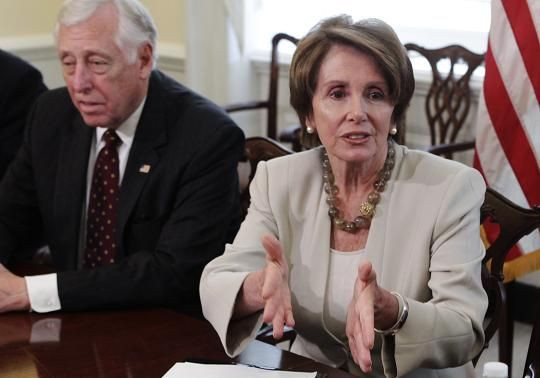Critics Say GOP Deficit Plan Wouldn't Even Raise Enough Revenue To Cover Tax Cuts For Wealthy

After weeks of resisting requests to offer a counter-proposal to avert the so-called fiscal cliff, on Monday House Republicans released a suspiciously vague plan that some experts say wouldn’t even create enough revenue to offset the costs of extending the Bush tax cuts for the top 2 percent of earners.
In a three-page letter to the White House, Republican House Speaker John Boehner spent two pages essentially discussing how disappointed the GOP was with the Obama administration’s initial deficit-reduction plan and the virtues of the Ryan budget, before spending two paragraphs “outlining” the Republican counteroffer.
The plan consists of the following: raising $800 billion in revenue through “pro-growth tax reform that closes special-interest loopholes and deductions while lowering rates” and about $1.2 trillion in mandatory and discretionary spending cuts (including a $600 billion reduction in health care spending).
“Notably, the new revenue in the Bowles plan would not be achieved through higher tax rates, which we continue to oppose and will not agree to in order to protect small businesses and our economy,” Boehner wrote, referring to a 2010 plan put forward by a deficit reduction commission co-chaired by former Republican Sen. Alan Simpson and former Clinton Chief of Staff Erskine Bowles.
As noted by Kevin Drum, Boehner seems to have created the "Bowles plan" -- which Bowles, in a statement, actually said he does not support -- based on Bowles’ oral testimony before last year’s supercommittee charged with coming up a plan to lower the federal deficit.
The big question, as Senate Majority Leader Harry Reid, D-Nev., asked on Tuesday, is just how the GOP plans to raise billions in revenue without raising taxes on middle class families. Although Boehner and other leading Republicans, including former GOP presidential nominee Mitt Romney, have said they are in favor of raising revenue by closing loopholes and deductions, the letter does not specify any particular tax breaks that would be done away with.
“Their proposal was short on specifics but, we do know from independent analysis that it is impossible to raise enough revenue and make a dent in our deficit without using one of two things: raising tax rates on the top 2 percent or raising taxes on the middle class,” Reid told reporters on Tuesday.
Multiple studies have suggested it is almost impossible to raise considerable amounts of revenue without increasing taxes on either top earners or the middle class. While some Republicans, including Romney, suggested capping itemized deductions at $50,000 could yield about $760 billion, an analysis of that strategy from the Tax Policy Center concluded it would still lead to higher taxes for about 4 percent of middle class households. But it’s a start.
Plus, the Center for Budget and Policy Priorities reports the GOP's suggested $800 billion in revenue is still inadequate. According to CBPP President Robert Greenstein, that amount would not even cover the cost of extending both the Bush-era tax cuts for the top 2 percent of earners and the estate-tax breaks for the top 0.3 percent.
The $600 billion in unspecified health care cuts would likely come from deeper reductions to Medicare and Medicaid, Greenstein wrote, which would almost solely impact lower-income Americans. The $300 billion in additional cuts from discretionary programs would also pose considerable risks to investments in areas such as education, food safety and various children’s programs, according to the CBPP.
“In short, people with low incomes or serious disabilities and elderly people of modest means would face substantial cuts, but people at the top would get to keep a significant share of their munificent tax cuts, “ Greenstein wrote.
On Tuesday afternoon, House Democrats filed a discharge petition that would force the lower chamber to vote on the Senate’s bill to extend the Bush tax cuts for the middle class but allow rates to rise on the highest earners. The petition, filed in response to Boehner’s proposal, will need 218 signatures to be taken out of committee and brought to the House floor for a vote.
© Copyright IBTimes 2024. All rights reserved.




















